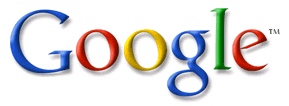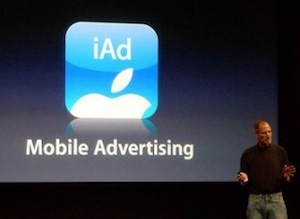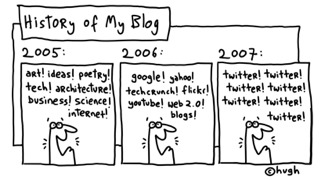I just read Google’s latest annual report. Well, not the whole thing, but the best part — the letter from the cofounders, Larry Page and Sergey Brin. Actually, this year’s letter is written by Larry, since the two trade off.  [I had the privilege of meeting Larry Page at a conference in March 2002, when the company had fewer than 200 employees. Still mad I didn’t slip him my resume.]
[I had the privilege of meeting Larry Page at a conference in March 2002, when the company had fewer than 200 employees. Still mad I didn’t slip him my resume.]
Wow, what a company! But I guess you don’t need me to tell you that… 🙂 Every time I ever meet anyone from Google, it’s a good experience. And there aren’t many companies I can say that about. The 2007 annual report has been out for a few weeks, I guess, but I was just now able to take some time to dig into it. I think everyone should read the letter, not just shareholders. So, here it is….
Excerpted from Google’s Annual Report 2007:
Letter from the Founders
Introduction
It is amazing to me that it has been nearly ten years since Sergey and I founded Google. When we went public, we promised to write a yearly founders’ letter in a frank style to keep all of you updated on our progress. We’ve taken turns writing the letter, and this year that responsibility falls to me.
We have seen our company scale tremendously, to more than 17,000 employees in 20 countries worldwide. But what’s even more amazing to me are the possibilities that appear before us—close enough to envision, but important enough to inspire our best efforts. I’m excited and hopeful we will continue to make progress in a wide variety of significant areas. I’m also happy to report that Sergey, Eric, and I continue to work together fabulously. I feel very lucky to be working with them and with our whole growing team (growing mostly just in numbers, despite our excellent food).
Speaking of our team, I wanted to give our deep thanks to George Reyes, our retiring chief financial officer. He has served Google extremely well. I also could not be more grateful to our users, customers, Googlers (our employees), and investors who help bring everything that is Google to life.
I will try to keep this letter relatively short, but I want to cover a lot of ground. I figure if you are interested in a particular area, you can just use Google to get more depth.
Still Searching
Search is a really hard problem. To do a perfect job, you would need to understand all the world’s information, and the precise meaning of every query. With all that understanding, you would then have to produce the perfect answer instantly. We are making significant progress, but remain a long way from perfection. We’re so serious about improving search that more than a third of our people are working on it. Another third work on advertising. We have dramatically improved our understanding of all the different languages, the meanings and synonyms of words, and the many different types of specialized information such as businesses and products. We continue our effort to extract more and more real meaning from the web in order to help people find the right answers. We recently improved universal search, integrating different types of relevant information, such as video, maps, news, books, images, and more, right into your search results.
Sometimes you don’t get a good answer to a search because the information simply isn’t available on the web. So we are working hard to encourage ecosystems that can generate more content from more authors and creators. For example, we recently announced an early version of a tool called "knol" to help people generate and organize more high-quality authored content.
Systems that facilitate high-quality content creation and editing are crucial for the Internet’s continued growth. Our AdSense program also helps the content ecosystem by letting any author or publisher instantly make money by inserting Google-brokered ads into their pages. This helps them pay people to write more great content in a virtuous and profitable cycle for everyone.
In all of these efforts, of course, the trust of our users is paramount. We simply will not bias our search results for financial reasons. Our ads are separated from the search results and clearly labeled. We believe strongly in maintaining the integrity of search.
I’m happy to report that we have a tremendous number of ideas to further improve search. Just about every week, we implement a new (and often clever) improvement to our basic search system. We will continue to work very hard in this area for a long time to come.
Advertising
Advertising is even harder than search. Not only do you have to find the right ad for every situation, but you have to handle paying customers! We have developed very sophisticated advertising systems designed to benefit both users and advertisers. For users, we strive to produce relevant advertising as good as the main content or search results. For advertisers, we provide tools to target and tune their advertising and accurately measure the results of their spending. Just as with search, we devise new clever improvements to our advertising system nearly every week. Fundamentally, every advertisement you see from Google results from a real-time auction conducted among advertisers. Imagine if we had a real auctioneer, how breathless and tired she would become!
Our advertising system works well, but we still have tremendous opportunities to improve it. For example, I just did a search for natural swimming pool, which returned eight righthandside ads, with only the last two of those somewhat relevant. This is both good and bad news. The good news is that we have enough breadth to have some relevant ads for an unusual topic. Furthermore, it is certainly possible to produce more relevant ads that would be valuable to both the user and the advertiser. Also, a user interested in natural pools is probably worth a considerable amount of money if there is enough competition among advertisers to bid up the auction price. The bad news is that we aren’t doing a good enough job yet for this natural pools query and many others. We also happened to have a number of local pool suppliers advertising in the San Francisco area for this query. Locally targeted advertising is another important area for us to grow both in revenue and relevance.
This general problem of ad targeting is very difficult and requires cooperation from huge numbers of advertisers. We continue to make significant progress on this challenging but exceptionally worthwhile problem. Sergey and I spend an action-packed hour nearly every week reviewing the noteworthy changes to the ads system.
70-20-10
We are still keeping to our long-standing plan of devoting 70% of our resources to search and advertising. We debate where we should classify our Apps (Gmail, Docs, etc.) products, but they currently fall into the 20% of resources we devote to related businesses. We use the remaining 10% of our resources on areas that are farther afield but have huge potential, such as Android. We strongly believe that allocating modest resources to new areas is crucial to continuing to innovate. This 10% of our resources generates a tremendous amount of interest and press, precisely because these projects are different and new. Often, we find small teams of only a few people suddenly command huge attention worldwide. That’s useful to keep in mind as you read about Google-the vast majority of our resources are working on our core businesses: search and advertising.
Of course, the needs of the 70% projects are different from the needs of the smaller 10% projects. While I would like to report we understand how to structure these perfectly, we are still actively evolving how we create, manage, and compensate these different kinds of projects. This is a crucial area of focus as we work to recruit and retain the best people, and keep them really happy, organized, and productive.
Acquisitions
Throughout our history, we have acquired more than 50 companies. Our goal is to be the best home for amazing companies that want to be acquired. We acquire companies in all different stages of development, but I will cover some of the larger deals here. We acquired YouTube a bit more than a year ago, and it has been growing like gangbusters. Eric worked with YouTube leaders Chad and Steve to establish a largely independent operating structure, with YouTube remaining in a separate office in San Bruno, about 25 miles from the main Googleplex. This is working well.
When we acquired Postini last year, we significantly enhanced our enterprise email capabilities and reinforced our commitment to serve the enterprise market. And by the time you read this, our acquisition of DoubleClick will have likely been cleared in Europe as well as the U.S. We are fortunate that DoubleClick’s headquarters is in the same building as our Manhattan Googleplex, which will make for easier communication between the combined teams, now totaling a few thousand people. I believe DoubleClick’s expertise in display advertising will be a tremendous addition to Google and will help open up new opportunities in this important market.
Apps
We have made tremendous strides in our web applications. I am writing this using Google Docs. I don’t have to worry that my computer hard drive might fail and lose my work, because it is automatically being saved into the Google network cloud. Sharing what I write is easy. My colleagues can write and edit the live copy without having to email endless revisions (my writing needs a lot of revising!). You can also create spreadsheets and presentations in Docs. Every week, I approve a Google spreadsheet with a summary of every single hire we are making worldwide. With Google Apps, you can collaborate and share all types of documents and calendars with other people in your organization in seconds.
Gmail continues to enjoy tremendous growth, and now has a brand new implementation that’s faster and makes it easier for us to add new features. Instant messaging within Gmail- which works right inside your browser with no installation-has been a big hit. We’re also planning to roll out a plethora of new features. We are working hard to combine our many Apps offerings into a more coherent set of products that "just work." I use Google Apps every day for all of my work.
Our products are improving quickly and have incredibly powerful sharing and chat functionality that wasn’t possible before the web.
We’ve started the next phase in productivity software. That phase is about working with everyone seamlessly and effortlessly. Our goal is fast, easy access to create or share from any computer in the world. No futzing with software required. Just open your browser.
Mobile
Android is our newly announced mobile phone platform. We’ve gathered more than 30 companies together into Android’s Open Handset Alliance. The goals of Android are ambitious: We aim to make your phone work better than your computer. Android is very open, so you can run any software, just like a computer. Today, Android is released as a software toolkit for developers based on Linux, Java, and high-end web browser technologies. We and our partners are very much looking forward to having Android ship in real devices. We are excited about realizing the potential of that little computer in your pocket (your cool, web-centric Android phone).
In addition to Android, we endeavor to make all of our products work well with existing phones and have been quite successful with much greater usage in a wide variety of areas. We have been working to try to apply some of the open-access principles of the Internet to increase user choice and innovation in the mobile space. We also have been active with a 10% project focused on wireless spectrum, which has created a great deal of interest. We were successful in helping convince the US Federal Communications Commission to attach most of our desired openness principles to the ongoing 700 Mhz auction.
The World
It turns out the real world matters to people, in the form of maps, satellite images, business locations, bike paths, and all other types of geographic data. We are hard at work in all these domains. We even launched photographs of nearly everything at street level in 30 metro areas, integrated right into Google Maps (click the Street View button). Google Earth literally goes out of this world with a new Sky mode (just click on the Sky icon). You can see an amazing view of the night sky, complete with super-high resolution images from the Hubble telescope that you can zoom right into.
Speaking of the world, we don’t want it to end-especially by environmental catastrophe. Consequently, we are working hard on our own considerable energy use in data centers by making them far more efficient. We’re working directly on our own carbon/methane off sets to cover our usage. But we are all on the same Spaceship Earth, and we need to energetically address harmful emissions. To this end, we launched RE<C, an initiative to make renewable energy cheaper than coal-fired plants. We have started our own internal development effort, and have made investments in promising technologies. We are working on new clean technologies that could make more energy than we have now, and do it at a lower cost. Our goal is to generate a gigawatt (roughly enough to power San Francisco) of clean, cheap energy in years, not decades. If we are successful, we will not only help the world, but also make substantial profits.
We continue our efforts to make Google more global. Google is available in 160 different local country domains and 117 languages (including some obscure ones like "Swedish Chef" – Bork, Bork, Bork). While Google is available virtually everywhere there is Internet access, our business operations are in just 20 countries. We are still working to establish a significant business presence in places such as the Middle East. As we expand our operations and hire our first employees in another country, that part of Google feels like a startup.
We started Google.org with the idea of eclipsing the impact of Google itself while focusing on more philanthropic causes. Though we are working on extremely tough problems in difficult locations, we have made significant strides. We have established several main focus areas, including predicting and preventing disease; improving public services by informing and empowering people; and increasing economic growth and job creation through stimulating small- and medium-sized enterprises.
Conclusion
By organizing the world’s information and making it universally accessible and useful, we’re helping people worldwide make better decisions and improve their lives. I feel lucky — I am lucky — to be involved in this important ecosystem of better information. While almost all of our effort is focused on important improvements to core search and advertising, the small percentage left over is producing a lot of important innovation and even more notice from the world. I could not be more excited about all the possibilities for Googlers to produce amazing computer experiences that their mothers and fathers — and hundreds of millions of other people — will use every day.
Larry Page
Co-Founder; President, Products
Sergey Brin
Co-Founder; President, Technology
————-
What do you think about this year’s letter? What stands out for you? Anything else you wished they would have addressed? (Note: I also blogged today about the Google-led initiative called "OpenSocial," over on my other blog, at NewMediaWise.com.)
 Unless you were totally off the grid in the Boundary Waters Canoe Area for the past few days, you surely know by now that Yahoo! has named former Google exec Marissa Mayer as its new CEO.
Unless you were totally off the grid in the Boundary Waters Canoe Area for the past few days, you surely know by now that Yahoo! has named former Google exec Marissa Mayer as its new CEO.  things to humanize business on the web.
things to humanize business on the web. 












 [I had the privilege of meeting Larry Page at a conference in March 2002, when the company had fewer than 200 employees. Still mad I didn’t slip him my resume.]
[I had the privilege of meeting Larry Page at a conference in March 2002, when the company had fewer than 200 employees. Still mad I didn’t slip him my resume.] 
Recent Comments